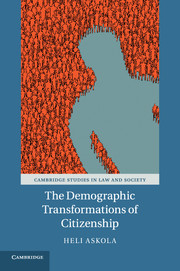Book contents
- Frontmatter
- Contents
- Acknowledgements
- 1 Introduction
- 2 Missing Citizens? Birth Rates and the Making of New Citizens
- 3 Misguided Citizens? Transitions into Adulthood and the Management of Diversity
- 4 Casual Citizens? The Desirable Labour Migrant and Conditional Citizenship
- 5 Depleting Citizens? Ageing Populations, Care and Migration
- 6 Conclusion
- Bibliography
- Index
- CAMBRIDGE STUDIES IN LAW AND SOCIETY
6 - Conclusion
Published online by Cambridge University Press: 05 September 2016
- Frontmatter
- Contents
- Acknowledgements
- 1 Introduction
- 2 Missing Citizens? Birth Rates and the Making of New Citizens
- 3 Misguided Citizens? Transitions into Adulthood and the Management of Diversity
- 4 Casual Citizens? The Desirable Labour Migrant and Conditional Citizenship
- 5 Depleting Citizens? Ageing Populations, Care and Migration
- 6 Conclusion
- Bibliography
- Index
- CAMBRIDGE STUDIES IN LAW AND SOCIETY
Summary
The previous four chapters have sought to elaborate on the multitude of demographic challenges facing contemporary migrant-receiving states in the Global North, examining the implications of international mobility against the broader demographic picture of low birth rates, increasing diversity and population ageing. States in the Global North have entered a new demographic phase in which all three of the basic components of population change (births, deaths and migration) are constant sources of demographic anxiety and are, together and separately, resulting in policy responses that are at times full of contradictions. The intention of this book, in bringing together analyses of low birth rates and demographic ageing with investigations into immigration, was to add new and much broader perspectives to the debates about the meaning and regulation of citizenship in an age of increasing international mobility. The aim was to discuss the implications of increasing international migration and its relevance to citizenship, and to place this discussion within a larger demographic context. This focus has allowed for an approach where immigration has been treated as part of the overall picture of demographic governance, in which citizenship could be explored in terms of both its boundary-crossing aspect and its inward-looking dimensions. This conclusion does not intend to summarise the book; instead, it takes a brief look at the issues explored and arguments made regarding the three components of demographic change – births, deaths and migration – and outlines how states' attempts to govern them will continue to change citizenship, as well as fleshing out some of the many interconnections between them.
Births are, in many ways, at the heart of the anxieties around population change, owing to the essential role national reproduction plays in nation-making. Chapter 2 discussed the demographic challenge posed by low birth rates, arguing that anxieties over population decline are crucially implicated in debates about both women's citizenship duties and the changing demographic make-up resulting from immigrant births. Population growth via above-replacement birth rates has been, until recently, the norm for most states. It has been so much the norm that most systems in contemporary states – their economic structures, most obviously – are based on the assumption of population growth: the age pyramid has been pyramid-shaped for a reason.
- Type
- Chapter
- Information
- The Demographic Transformations of Citizenship , pp. 188 - 192Publisher: Cambridge University PressPrint publication year: 2016



